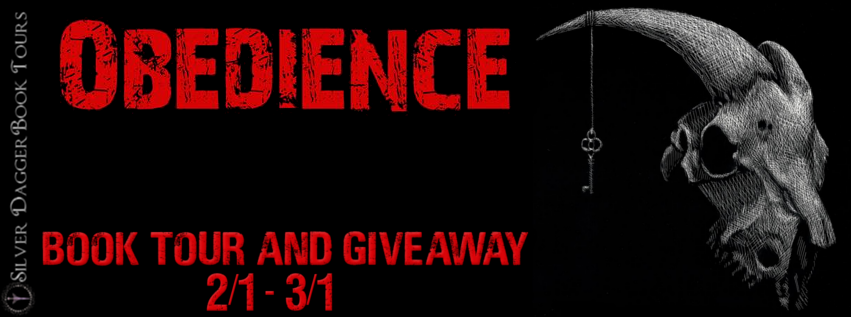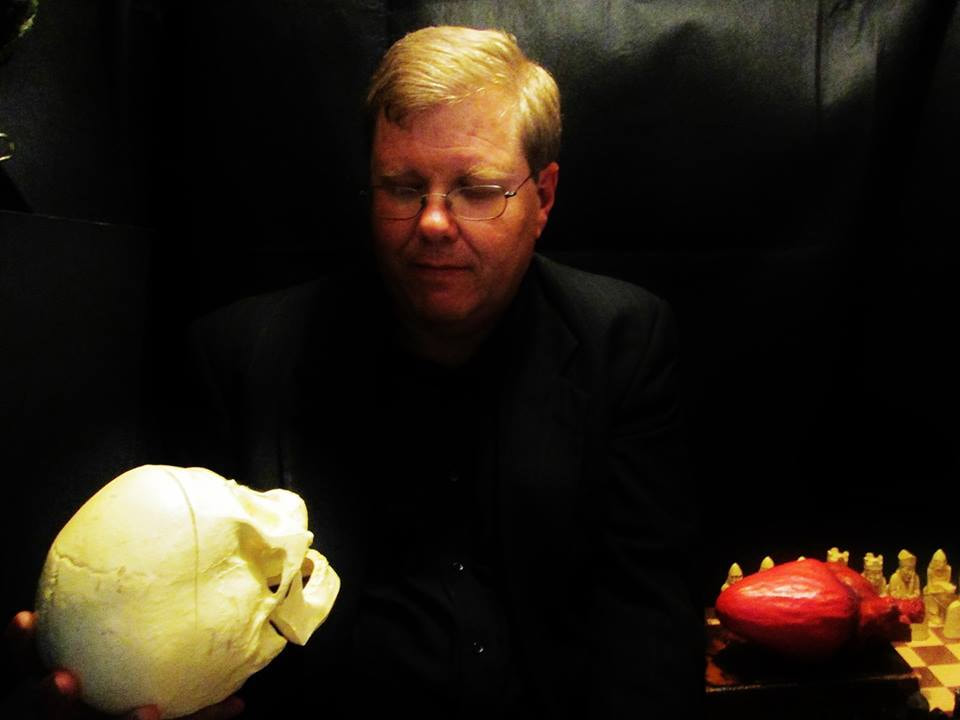Obedience by Michael Potts Book Tour and Giveaway :)
Obedience
by
Michael Potts
Genre:
Horror
It
is a lazy summer day in the Appalachian foothills of Tennessee; much
like the day before, and the day before that. Everything seems normal
- at least on the surface; like an idyllic, pastoral painting; the
sky dyed with pastels of blue and white, the ground carpeted with
dark green fescue and bluegrass, a clapboard farmhouse resting on top
of a hill, sugar maples, oaks and Eastern red cedars providing
welcome shade from the heat of a Tennessee summer sun. You can almost
see moving images of little children running barefoot through the
grass; an era before tweeting and texting and the triumph of
technology over all.
Alas,
appearances lie.
Behind
the clapboard farmhouse sits a red barn, all bright and new looking;
fresh enough to lull a casual observer into believing it the benign
keeper of hey for cattle and shelter for goats. A closer look reveals
the color to be not barn red, but blood red.
Locals
tend to close their eyes when passing by that barn. Something is just
not right about it. Some say it is unnatural. Some say it's obscene
and evil. But they don't say such things out loud, for the owner of
the barn is Sheldon Sprigg, a well-respected man of the cloth, the
preacher at Hare’s Corner Church of God Incarnate. Sheldon is the
most upright man in these parts. He keeps the law religiously, and
makes sure his wife and teenaged daughter do too. After all, to obey
is better than sacrifice.
Still,
there's just something that not right about that barn.
Sheldon stands
beside the open window, waiting for God to speak again. A breeze
tousles his hair. He folds his arms tightly and shivers. The breeze
continues to blow, riffling through the pages of his open Bible.
Sheldon gasps as the breeze dies down, and the pages stop turning. Lord, is this
Your sign? This must be a sign! The Bible is opened
to the first chapter of II Thessalonians in the New Testament. A
sharp red glow highlights part of the page, and Sheldon reads out
loud. “And to you who
are troubled rest with us, when the Lord Jesus shall be revealed from
heaven with his mighty angels, in flaming fire taking vengeance on
them that know not God, and that obey not the gospel of our Lord
Jesus Christ: who shall be punished with everlasting destruction from
the presence of the Lord, and from the glory of his power.” Sheldon stumbles to
a chair, hyperventilating. He whispers to himself, “This has to be
about Ginny. She won’t listen to me. She is running further from
God every day. She constantly disobeys God and is disrespectful to
me. I have to do something to save her soul from everlasting torment
in hell. Lord, I beg you, show me how to save her.” A bright, white
light from outside streams through the window, illuminating the room.
Sheldon peeks out the window. The light seems to have its source in
the barn. Sheldon laughs out loud, then stifles the laugh and
whispers. “Yes! A sign! Lord! Oh Lord! Tell me how to save my
Ginny!” Sheldon runs
downstairs, out the back door and into the yard. He walks toward the
barn but covers his eyes as the light grows brighter. He falls to the
ground and speaks into the red clay earth that smells like a freshly
plowed garden in the cool of the night. He begins to pray. “Lord, I am dust
compared to thee. Forgive me. Help me, Thy unworthy servant, to save
Ginny, my only child. Thou knowest I have lost Daddy to eternal
torment. Don’t let me lose Ginny.” Sheldon’s eyes
remain closed, and he does not see the being coalesce in the light.
It is humanoid in shape and blood-red in color like the barn. Its
thick arms have wrinkled hands that end in sharp claws. The body is
covered with scales that steam with smoke. If the beast were not
humanoid someone might label it as a dragon. Curved, goat-like horns
and small ears appear on each side of its hairless head. It has no
teeth, but its lips are abnormally wide, the mouth perpetually open
in a mocking smile. Smoke hides the
being for a few seconds, and when the smoke clears a figure appears
who looks like a stereotypical painting of Jesus Christ: long, dark
hair, white, seamless robe, and sandals. A bright glow surrounds the
body and a halo appears over its head. The light fades, and Sheldon
raises his head. He immediately swoons, and the figure lifts him to
his feet and smiles. “Sheldon Sprigg,”
the creature says, using exactly the same still, small voice Sheldon
heard by his daddy’s grave. Sheldon’s head is
slightly bowed, his eyes closed. He feels as nothing before Christ
his God. He speaks in a voice that approaches a groan. “Oh Lord, I
can’t gaze upon at your face. It’s too bright.” The being that looks
like Jesus says, “I must adjust my appearance so that you are able
to look at me without dying. I have seen your home and have
compassion for you in your struggles. How I can help you
with...Ginny?” Sheldon opens his
eyes and extends his arms, as if pleading. “Thank you, Jesus. Ginny
doesn’t want to obey you. My wife takes up for the girl. I know
Thou hast seen all of this.” The false Jesus
says, “You can call me ‘You’. No need to talk to me like Mary
Tudor. As for Ginny, things are far worse with her than you realize.”
He places his hands on Sheldon’s head. Sheldon’s eyes
fill with tears, and he snuffles out the words, “What has she done
now?” The creature’s
voice grows deeper and louder, a trumpet sounding out the wrath of
God. “Tonight,” he says, “when Ginny was supposed to be
studying, she went to a bar with her evil friend, Susie.” Sheldon looks up at
“Jesus” and holds his hands to his head, shaking his head as in
denial. “Ginny? Drinking?” The phony Jesus’
voice remains deep, and more than a tinge of anger is present. “Do
you doubt my word?” he asks. Sheldon pales, bows
to the creature, and says, “No, Lord! I never doubt you. Forgive me
if it seemed that way. What can I do to save Ginny’s soul?” The Creature
replies, “You must punish her so severely she will remember never
to disobey me - or you - again. If Elma
gets in the way, you must be a man and stand up to her. As to how
severely you punish Ginny, you can use your best judgment — unless
things get worse. You have been far too lenient.” I have been too
lenient, even these past six months, Sheldon
thinks. Elma
interferes due to her mushy heart. Her meddling will cause Ginny to
lose her soul, and Elma will damn herself for failing to train Ginny
in the nurture and admonition of the Lord. I’ll end up losing both
Ginny and Elma to Satan’s fold if I fail the task my Lord gave me. “Forgive me for my
past leniency, Lord,” Sheldon says. “I have failed thus far as a
father. I won’t fail Ginny, nor will I fail You again. She will
never forget what I have in store for her. Never. I promise, Lord.” “Good,” the
creature says. “You will see me again. Go inside, and don’t look
back. Remember Lot’s wife.” Sheldon turns and
walks toward his back door. He takes care not to look behind him.
Lot’s wife looked back toward Sodom and Gomorrah and changed into a
pillar of salt. Sheldon is so focused on not looking back that he
fails to see the stumbling block right in front of him. He sprawls to
the ground, rolling to his side with his face directly toward Jesus.
He clamps his eyes shut, wildly praying for mercy that he might not
be consumed in fire and brimstone. He gets up, lowers his head, turns
around, and starts toward the house again. He leaps and yelps like a
toy poodle when the reflection of his face in a puddle startles him. “Jesus Christ!”
Sheldon curses. He immediately bows his head and prays, “Forgive
me, Lord. I did not mean to use Thy name — Your
name
— in vain.” Sheldon brushes
straw and dirt off his back, shakes his head, opens the back door of
the house, and steps inside.
Michael Potts grew up near Smyrna, Tennessee and is currently Professor of Philosophy at Methodist University in Fayetteville, North Carolina. His undergraduate degree (in Biblical languages) is from David Lipscomb University. He also holds the Master of Theology from Harding University Graduate School of Religion, the Master of Arts (in Religion) from Vanderbilt University, and the Ph.D. in philosophy from The University of Georgia. Michael has twenty articles in scholarly journals, nine book chapters, six encyclopedia articles, six book reviews, and he co-edited the book, "Beyond Brain Death: The Case Against Brain Based Criteria for Human Death," which was published in 2000 by Kluwer Academic Publishers. He also has over fifty scholarly presentations, including one presented at the Pontifical Academy of Sciences at The Vatican in 2005. Michael is a 2007 graduate of The Writers Loft at Middle Tennessee State University and a 2007 graduate of the Odyssey Writing Workshop at St. Anselm College in Manchester, New Hampshire. His poetry has been published in Journal of the American Medical Association, Iodine Poetry Journal, Poems & Plays, and other literary journals. His poetry chapbook, "From Field to Thicket," won the 2006 Mary Belle Campbell Poetry Book Award of the North Carolina Writers Network. His creative nonfiction essay, "Haunted," won the Rose Post Creative Nonfiction Award, also sponsored by the North Carolina Writers Network. Besides reading and writing, he enjoys vegetable gardening, canning, and ghost investigations. He and his wife, Karen, live with their three cats, Frodo, Rosie, and Pippin, in Linden, North Carolina.
A
Christian Writer Who Does not Write “Christian Fiction”
Writing
should never be preachy. The story, both plot and characterization,
are key—the principle, “Show, don’t tell,” is one every
writer should follow. The reason so much Evangelical Christian
fiction is not well-written is that much of it is preachy and
didactic, precisely the opposite of good writing. No reader wants to
be lectured! There are exceptions—Frank Peretti, Ted Dekker, and
Billy Coffey, for example, are fine writers who tell good stories
without the preachiness—and I wish other Evangelical Christian
writers would do the same.
There
are also writers who were devout Christians who did not write what is
today labeled “Christian fiction.” J. R. R. Tolkien was a devout
Roman Catholic, and his religion shines through in his great work,
The
Lord of the Rings,
but indirectly and not in a preachy way. The world of his novel is
pre-Christian, but there are echoes of Christian thought in it—Frodo
as the suffering hero, Sam, faithful to his Master, Aragorn, the
king, as healer, Galadriel, who is similar in some respects to Mary
the mother of Jesus. Dean Koontz can be preachy at times, but his
plots are often so suspenseful that one does not notice the
traditional Catholic world-view that clearly comes through. William
Peter Blatty’s The
Exorcist,
is explicitly Catholic horror—however, if one reads the novel, one
finds that it is not didactic at all. I doubt, however, that the
average Evangelical Protestant would recognize it as “Christian
fiction.”
My
works reflect a Christian world view, but they are not “Christian
fiction.” I am a devout, traditional Christian, a member of a
theologically conservative church, the Anglican Catholic Church. My
novels, however, are too edgy, have too many “cuss” words, have
explicit sexual scenes—all of which would turn off some
Evangelicals, perhaps most. Yet if I write a character honestly, the
character’s speech will reflect who that character is. If I am
writing about a smart-mouthed teen originally from Brooklyn (like the
character “Susie” in my horror novel, Obedience),
she is going to use foul language. When my character, Jeffrey Conley
(in another horror novel I wrote, Unpardonable
Sin),
is angry with God, he curses God with about every curse word there
is, including calling God a “mo… f…er.” That goes way too far
for most Evangelical Christians to accept. I refuse to be dishonest
to my characters in the name of some Puritan standard.
I
also try to avoid preachiness and tell a good story. If you read my
novels to the end, you will find that they clearly reflect a
Christian world view, but my hope is that you find it revealed
through the story, rather than through some preachy character’s
direct speech. To be didactic is to betray the art of writing, and
that I cannot in good conscience do.
A member of a
non-Christian religion or an agnostic or atheist can read my books
and enjoy them. If they see the Christian world view shining through,
great; if not, that’s fine—but I hope all people of all
persuasions will conclude they have read good and gripping stories.
Follow
the tour HERE
for exclusive excerpts, guest posts and a giveaway!









Comments
Post a Comment